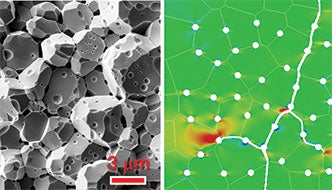The U.S. Department of Energy (DOE) has awarded $800,000 to Jie Lian, associate professor of mechanical, aerospace, and nuclear engineering, to support his efforts to predict nuclear fuel performance and, ultimately, help create cleaner, cheaper, and safer nuclear energy.
The three-year grant, from the DOE’s Nuclear Energy Advanced Modeling and Simulation (NEAMS) program, will fund research designed to better understand the thermal properties and fracture behavior of sintered uranium dioxide fuel pellets—essential components of the fuel assemblies inside nuclear reactors.
Each assembly consists of uranium oxide fuel pellets, stacked and enclosed in fuel rods that are bundled together. The fuel experiences drastic microstructure and chemistry changes upon burning, significantly impacting fuel performance and reactor efficiency. Quantifying these changes and their effects is very expensive and can take years.
To reduce these obstacles, NEAMS has developed MARMOT, a mesoscale multiphysics simulation tool that will help predict the performance of different fuel systems and how that performance will change over time. Lian’s research, conducted in collaboration with Pennsylvania State University and Idaho National Laboratory, will provide critical experimental data to verify and help refine the MARMOT model.
“The model is based on simulation, but we don’t yet have the experimental data to verify that the model is correct,” Lian says.
He and his team will fabricate and test unique microstructures across different scales, from nanoscale to micron scale to much larger scales. The researchers will experiment with grain sizes and pore sizes and locations, investigating changes in cracking and other thermal behavior.
“We will establish correlations between the microstructure and the changes to its physical properties,” Lian explains. “These results will provide critical data to validate the MARMOT model and support the development of future models.”

Sintered fuels with well-controlled and quantified microstructures at various length scales, varying from nano-metered to micro-sized.
The NEAMS award is the latest recognition of Rensselaer’s leadership in nuclear engineering. The grant also underscores the importance of Lian’s research, which focuses on better understanding advanced materials and nanomaterials to further nuclear energy production. In addition to the DOE, he has received research awards from the National Science Foundation (NSF), U.S. Department of Defense, and Nuclear Regulatory Commission (NRC).
“Professor Lian’s research beautifully combines the areas of advanced materials and nanotechnology with computer modeling and simulations, which are among the highest priorities for the School of Engineering and the Institute,” said Shekhar Garde, dean of the School of Engineering. “This DOE grant is a recognition of Jie Lian’s leadership in this interdisciplinary research area.”
Lian is the author or co-author of more than 200 studies in peer-reviewed journals and is a frequent speaker at international conferences. He has won a Faculty Early Career Development Award (CAREER) from the NSF, a Faculty Development Award from the NRC, a Distinguished Scholar Award from the Microbeam Analysis Society, and the School of Engineering Research Excellence Award from Rensselaer.
A graduate of Yanshan University in China, Lian earned a master’s degree in materials science and engineering from Tsinghua University, also in China.
He also has a master’s degree in electrical engineering and master’s and doctoral degrees in nuclear engineering and radiological sciences, all from the University of Michigan.



